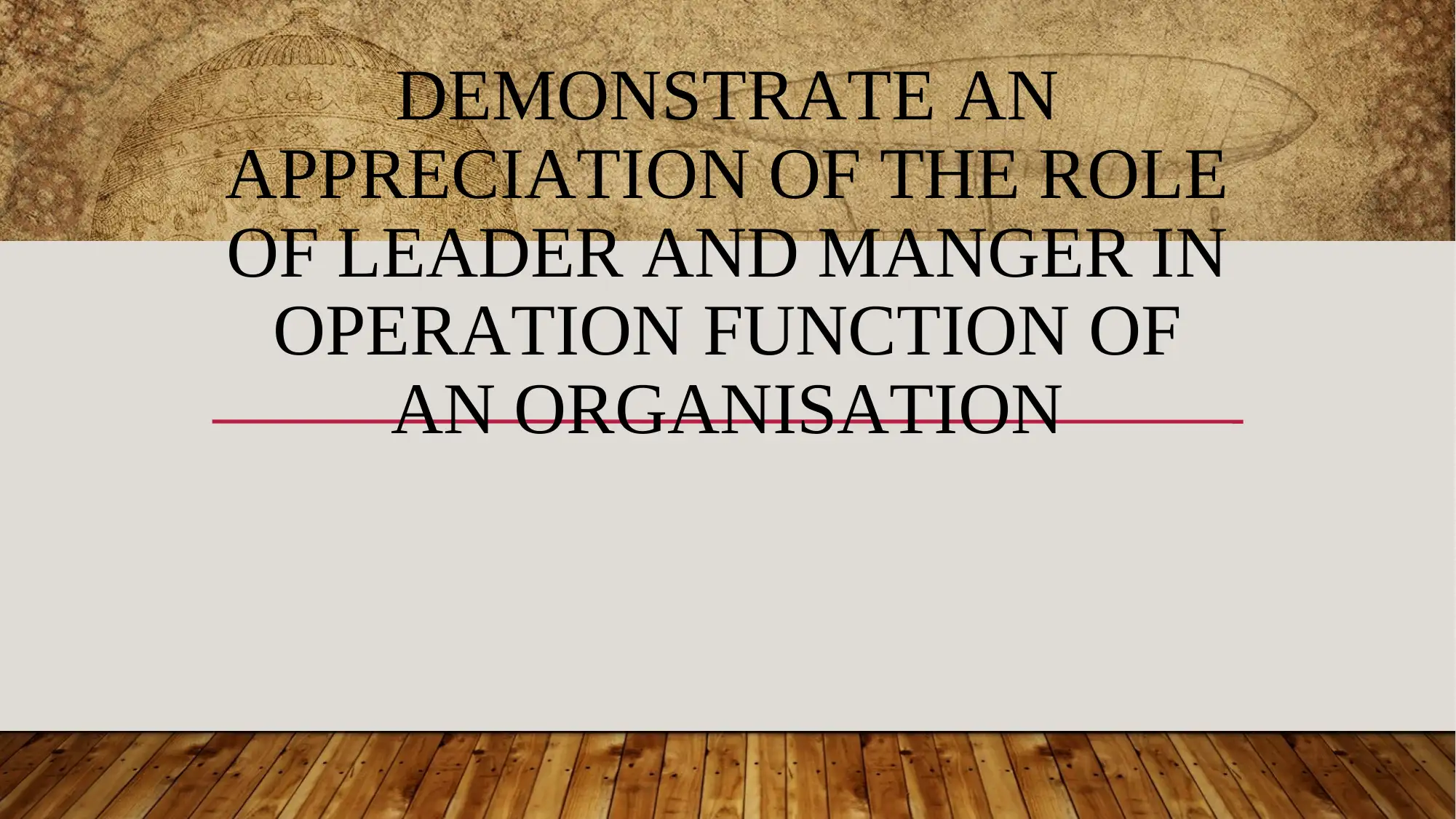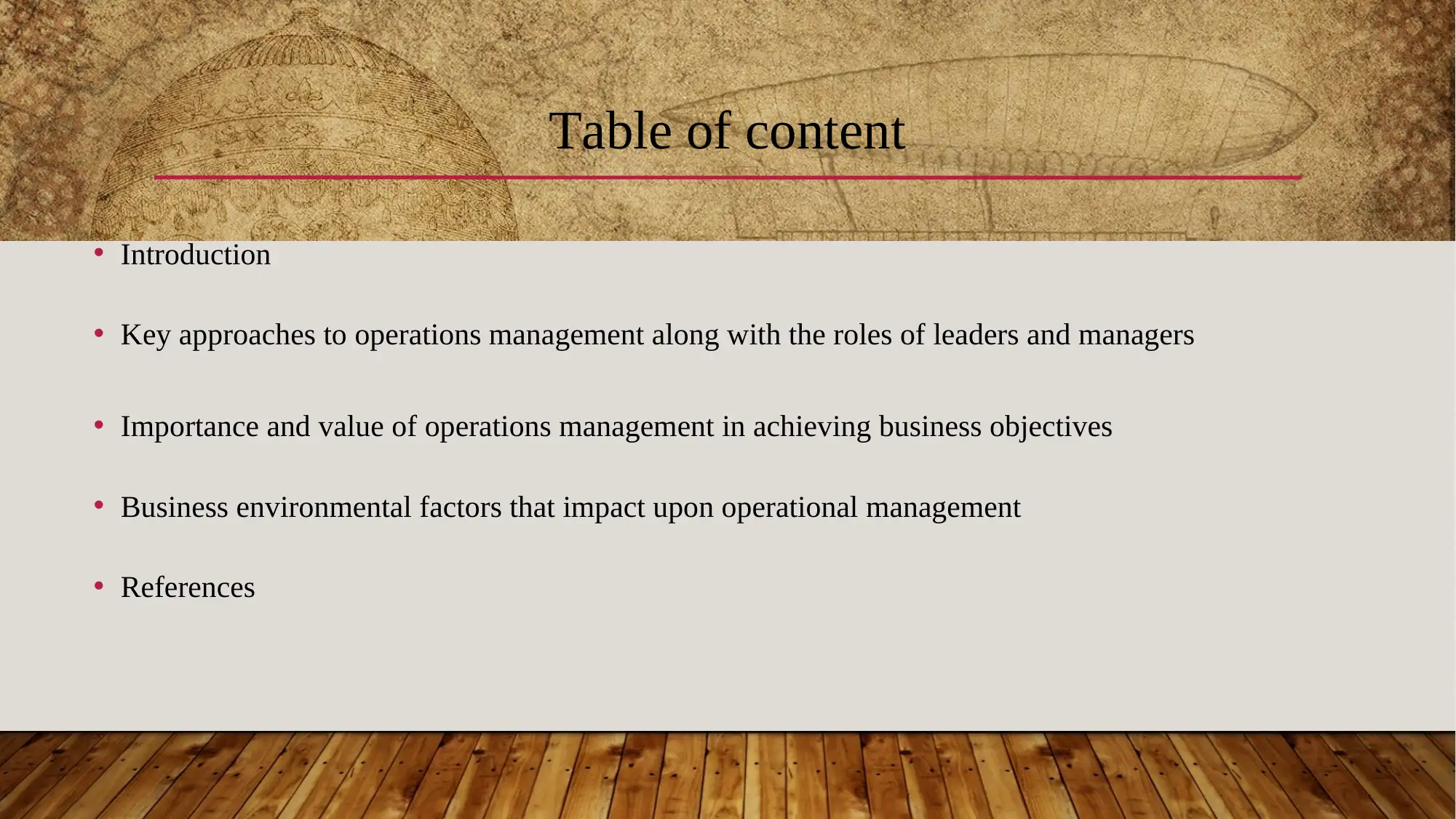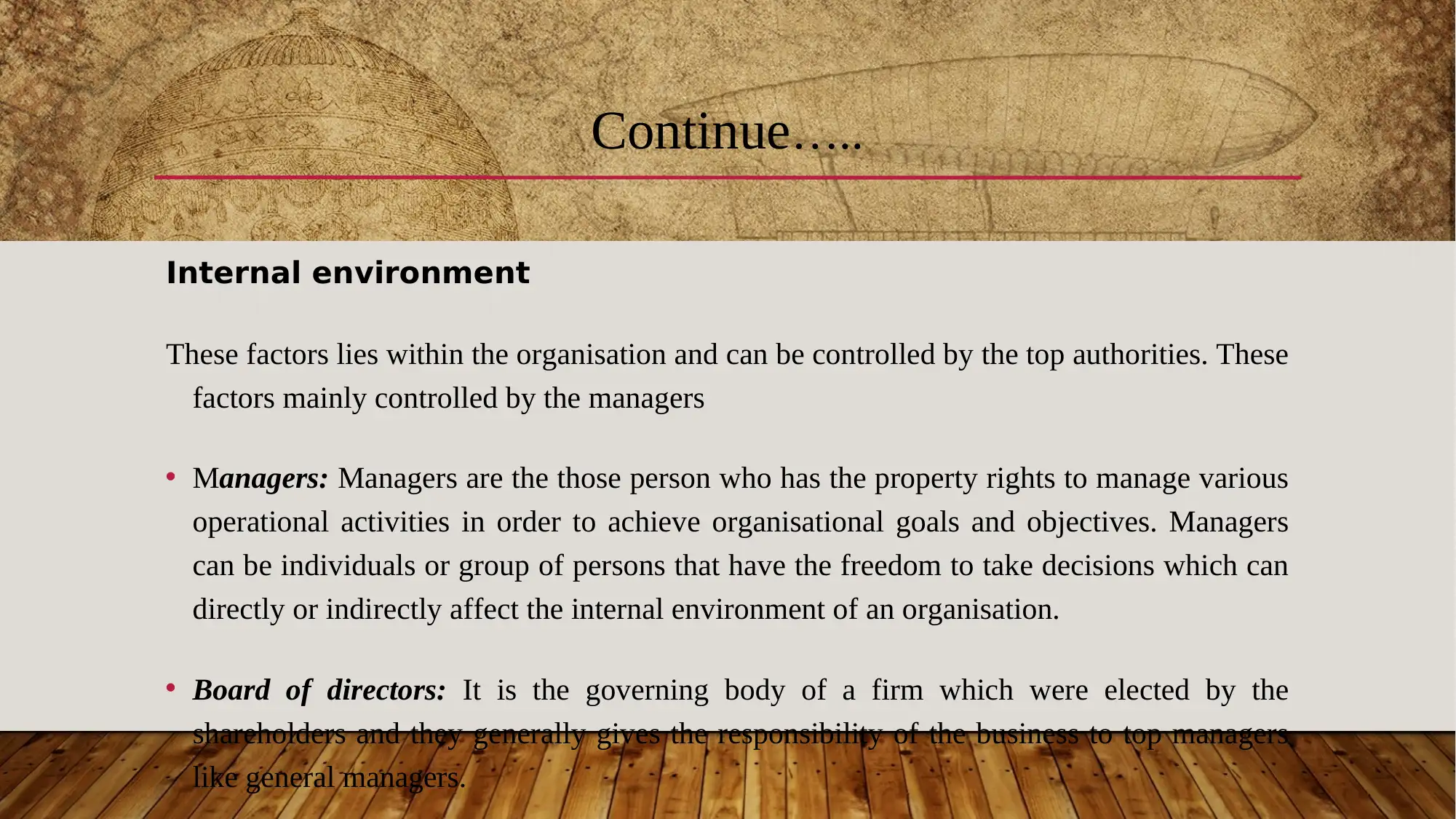Appreciation of Leadership and Management in Operations Function
VerifiedAdded on 2023/02/02
|13
|960
|38
Report
AI Summary
This report provides a comprehensive overview of the roles of leaders and managers within the operations function of an organization. It begins by highlighting the importance of leadership in motivating employees to achieve organizational goals. The report then delves into key approaches to operations management, including Total Quality Management, Just-in-Time, Lean products, and Six Sigma, detailing the responsibilities of leaders and managers in each approach. Furthermore, it emphasizes the value of operations management in achieving business objectives, such as cost minimization, time management, enhanced performance, and effective evaluations. The report also examines the business environmental factors, both internal and external, that impact operational management, including managers, board of directors, political and economic factors. The report concludes by providing a list of relevant references to support its findings.

DEMONSTRATE AN
APPRECIATION OF THE ROLE
OF LEADER AND MANGER IN
OPERATION FUNCTION OF
AN ORGANISATION
APPRECIATION OF THE ROLE
OF LEADER AND MANGER IN
OPERATION FUNCTION OF
AN ORGANISATION
Paraphrase This Document
Need a fresh take? Get an instant paraphrase of this document with our AI Paraphraser

• Introduction
• Key approaches to operations management along with the roles of leaders and managers
• Importance and value of operations management in achieving business objectives
• Business environmental factors that impact upon operational management
• References
Table of content
• Key approaches to operations management along with the roles of leaders and managers
• Importance and value of operations management in achieving business objectives
• Business environmental factors that impact upon operational management
• References
Table of content

Leader and Managers plays crucial role in managing
the operational functions of an organisations. Leader
plays important role in motivating the direction to
subordinates in order boost up them to perform
different operational function of the organisation to
achieve goals and objectives. Leadership is the
process of motivating other employees to act in
particular way in order to achieve some specific
goals and objectives. s
Introduction
the operational functions of an organisations. Leader
plays important role in motivating the direction to
subordinates in order boost up them to perform
different operational function of the organisation to
achieve goals and objectives. Leadership is the
process of motivating other employees to act in
particular way in order to achieve some specific
goals and objectives. s
Introduction
⊘ This is a preview!⊘
Do you want full access?
Subscribe today to unlock all pages.

Trusted by 1+ million students worldwide

• Some of the key approaches of operation management along with roles and
responsibilities of leader and managers are discussed below:
• Total quality management: Total quality management is considered as one of the
approach that is used by the leaders and manager to manage well overall operational
activities. Total quality management is considered as philosophy or continuous
improvement approach in order to run business through an appropriate management
model
Key approaches to operations management
along with the roles of leaders and managers
responsibilities of leader and managers are discussed below:
• Total quality management: Total quality management is considered as one of the
approach that is used by the leaders and manager to manage well overall operational
activities. Total quality management is considered as philosophy or continuous
improvement approach in order to run business through an appropriate management
model
Key approaches to operations management
along with the roles of leaders and managers
Paraphrase This Document
Need a fresh take? Get an instant paraphrase of this document with our AI Paraphraser

• Just in time: Just in time is the approach that is implemented by managers in order to
maintain stocks. It mainly concerned with the stock management where organisation
mainly focuses on controlling stock. Just in time approach helps managers in producing
products within the required time frame. Through this approach inventory management is
controlled and managed.
• Lean products: This approach mainly used by the managers of the organisation to
minimise the costs of the product along with the wastage in production department. This
approach allows to handle and provide strength to support the production department to
get desired outcomes with limited resources wastage
Continue…..
maintain stocks. It mainly concerned with the stock management where organisation
mainly focuses on controlling stock. Just in time approach helps managers in producing
products within the required time frame. Through this approach inventory management is
controlled and managed.
• Lean products: This approach mainly used by the managers of the organisation to
minimise the costs of the product along with the wastage in production department. This
approach allows to handle and provide strength to support the production department to
get desired outcomes with limited resources wastage
Continue…..

• Six Sigma: This approaches includes with advance tools and techniques that enables
employees to order products free with less defects. This approach mainly provides
adequate transportation methods to avoid the defects in the products. Through this
approach implementation organisations are able enhance the satisfaction among the
customers and provide quality products to their customers.
Continue…..
employees to order products free with less defects. This approach mainly provides
adequate transportation methods to avoid the defects in the products. Through this
approach implementation organisations are able enhance the satisfaction among the
customers and provide quality products to their customers.
Continue…..
⊘ This is a preview!⊘
Do you want full access?
Subscribe today to unlock all pages.

Trusted by 1+ million students worldwide

Some of the importance and value of operations management are discussed below:
• Cost minimisation: Through proper operation management it is possible to reduce down
the cost of products and services while producing for optimal utilisation and allotment of
the resources. Every organisations need to be careful when they are producing new or
modified products as it may increase the expense of the product.
• Time management: It is one of the positive and crucial factors of operation management
that directly helps and allows to managing time when there is increase in efficiency along
with productivity of work.
Importance and value of operations
management in achieving business objectives
• Cost minimisation: Through proper operation management it is possible to reduce down
the cost of products and services while producing for optimal utilisation and allotment of
the resources. Every organisations need to be careful when they are producing new or
modified products as it may increase the expense of the product.
• Time management: It is one of the positive and crucial factors of operation management
that directly helps and allows to managing time when there is increase in efficiency along
with productivity of work.
Importance and value of operations
management in achieving business objectives
Paraphrase This Document
Need a fresh take? Get an instant paraphrase of this document with our AI Paraphraser

• Enhance performance: With the proper management of operational activities it becomes
easy for the organisation to boost up the morale of the employees that will lead to
enhance their work productivity while performing their roles and responsibilities at
workplace.
• Evaluations: Through operational management it becomes easy to monitor overall
activities that allows to eliminate some inefficiencies which mainly includes lack of
availability of raw materials , over staffing or excess increase of inventories.
• Financial and human resource management: Financial management is crucial for
every businesses firm because without managers and leaders is not possible to execute
various operational activities
Continue…..
easy for the organisation to boost up the morale of the employees that will lead to
enhance their work productivity while performing their roles and responsibilities at
workplace.
• Evaluations: Through operational management it becomes easy to monitor overall
activities that allows to eliminate some inefficiencies which mainly includes lack of
availability of raw materials , over staffing or excess increase of inventories.
• Financial and human resource management: Financial management is crucial for
every businesses firm because without managers and leaders is not possible to execute
various operational activities
Continue…..

Business Environment is referred as the
surroundings or situations in an organisation in
which various activities are carried out in the
organisation in an appropriate hierarchical
structure where all products are put together to
obtain best results.
Business environmental factors that impact
upon operational management
surroundings or situations in an organisation in
which various activities are carried out in the
organisation in an appropriate hierarchical
structure where all products are put together to
obtain best results.
Business environmental factors that impact
upon operational management
⊘ This is a preview!⊘
Do you want full access?
Subscribe today to unlock all pages.

Trusted by 1+ million students worldwide

Internal environment
These factors lies within the organisation and can be controlled by the top authorities. These
factors mainly controlled by the managers
• Managers: Managers are the those person who has the property rights to manage various
operational activities in order to achieve organisational goals and objectives. Managers
can be individuals or group of persons that have the freedom to take decisions which can
directly or indirectly affect the internal environment of an organisation.
• Board of directors: It is the governing body of a firm which were elected by the
shareholders and they generally gives the responsibility of the business to top managers
like general managers.
Continue…..
These factors lies within the organisation and can be controlled by the top authorities. These
factors mainly controlled by the managers
• Managers: Managers are the those person who has the property rights to manage various
operational activities in order to achieve organisational goals and objectives. Managers
can be individuals or group of persons that have the freedom to take decisions which can
directly or indirectly affect the internal environment of an organisation.
• Board of directors: It is the governing body of a firm which were elected by the
shareholders and they generally gives the responsibility of the business to top managers
like general managers.
Continue…..
Paraphrase This Document
Need a fresh take? Get an instant paraphrase of this document with our AI Paraphraser

External environment
These are the external forces that affects the business operations of a firm. These factors are
not controlled by managers. Company can overcome these factors by implementing
suitable strategies and policies. Pestle analysis has been done in order to find out the
impacts.
• Political Factors: It refers to the laws and regulations of a country which is implemented
by government for managing the business operations of a firm.
• Economic factor: Such factors include economic growth, exchange managers, inflation
managers, interest managers etc.
Continue…..
These are the external forces that affects the business operations of a firm. These factors are
not controlled by managers. Company can overcome these factors by implementing
suitable strategies and policies. Pestle analysis has been done in order to find out the
impacts.
• Political Factors: It refers to the laws and regulations of a country which is implemented
by government for managing the business operations of a firm.
• Economic factor: Such factors include economic growth, exchange managers, inflation
managers, interest managers etc.
Continue…..

• Grant, D. B., Wong, C. Y. and Trautrims, A., 2017. Sustainable logistics and supply
chain management: principles and practices for sustainable operations and management.
Kogan Page Publishers.
• Groves, C., Frater, L., Lee, R. and Stokes, E., 2011. Is there room at the bottom for CSR?
Corporate social responsibility and nanotechnology in the UK. Journal of business ethics.
101(4). pp.525-552.
References
chain management: principles and practices for sustainable operations and management.
Kogan Page Publishers.
• Groves, C., Frater, L., Lee, R. and Stokes, E., 2011. Is there room at the bottom for CSR?
Corporate social responsibility and nanotechnology in the UK. Journal of business ethics.
101(4). pp.525-552.
References
⊘ This is a preview!⊘
Do you want full access?
Subscribe today to unlock all pages.

Trusted by 1+ million students worldwide
1 out of 13
Related Documents
Your All-in-One AI-Powered Toolkit for Academic Success.
+13062052269
info@desklib.com
Available 24*7 on WhatsApp / Email
![[object Object]](/_next/static/media/star-bottom.7253800d.svg)
Unlock your academic potential
Copyright © 2020–2026 A2Z Services. All Rights Reserved. Developed and managed by ZUCOL.





